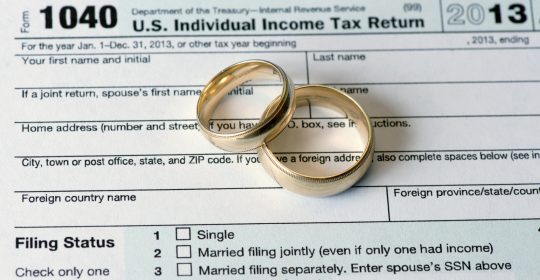 Make no mistake about it – divorce and taxes are two of the most unpleasant subjects out there. And if you are going through the process of a divorce, taxes are probably one of the last things you want to think about. But divorce can have major effect on your taxes – and the more you know about your tax implications when you’re preparing for a divorce settlement, the less you’ll have to worry about them later.
Make no mistake about it – divorce and taxes are two of the most unpleasant subjects out there. And if you are going through the process of a divorce, taxes are probably one of the last things you want to think about. But divorce can have major effect on your taxes – and the more you know about your tax implications when you’re preparing for a divorce settlement, the less you’ll have to worry about them later.
Can I File for My Taxes as an Unmarried Person?
When you file your taxes, you can consider yourself unmarried if there was a final decree of divorce or separate maintenance by the last day of the tax year. You can also consider yourself unmarried for the whole year if there was a decree of annulment.
If you do not have a final decree of divorce, separate maintenance or annulment by the final day of the tax year, you and your spouse can be held jointly and individually responsible for any tax, interest or penalties due on your joint return. (“Jointly and individual responsible” means that either one of you – or both of you – can be held responsible for the full amount that you owe.)
Taxes on Spousal Support
Generally, the spouse who is providing spousal support can claim the cost as a deduction, and the spouse who receives the support must pay taxes on it. However, if both spouses consent, a clause can be included in the divorce settlement stating that the spousal support will not be taxable. This will mean that the party who receives the support cannot be taxed on it, but it also means that the party paying spousal support will not be able to claim the support as a deduction.
Child support has different tax implications than spousal support. While spousal support is usually taxable, child support is not taxable.
Tax Concerns for Divorced Parents
If you couldn’t claim to be the head of a household on your income taxes when you were married, that may no longer be the case once your divorce is finalized. If you are no longer married, and you have a dependent (such as a child) who has lived with you for at least half of the tax year, you can have the status of a head of household. This can save you a significant amount of money, as it gives you a higher standard deduction, and wider tax brackets.
Even if you cannot claim to be the head of a household, you may be able to deduct certain costs as child care credit. If both you and your former spouse have paid for the cost of childcare (such as daycare, or after-school care), then both of you can claim the child care tax credit.
Getting Help from a Lawyer
If you are currently going through the divorce process, or if your divorce has been finalized and you have questions about your taxes, you may wish to contact an attorney. An experienced attorney can provide advice that is specific to your situation, and ensure that your interests are protected.
